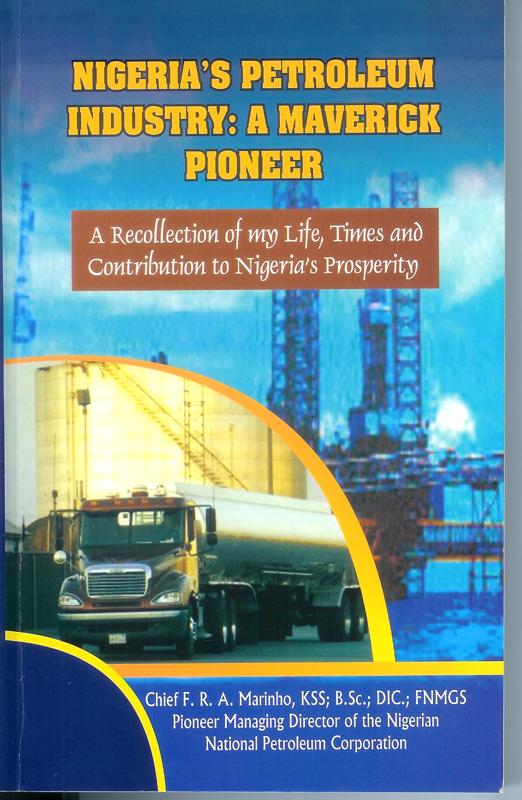On May 21, 2010, friends, well wishers and relations of Chief Festus Ayodele Remilekun Marinho will gather at the Institute of International Affairs on Kofo Abayomi Street, in Lagos for the formal presentation and launch of his book: The Nigerian Petroleum Industry: A Maverick Pioneer.
An explosive and brutally frank book, it pulls no punches in dealing with the dark moments and the acts of commission and omission by major players in the formative years of the Nigerian petroleum industry. His story has been told from the vantage position of one who passed from the very beginning, through every stage of the evolution of the public service sector of the industry in Nigeria as well as the dramatic changes in the international industry, which was triggered by the coming into the limelight of the Oil Producing and Exporting Countries, OPEC.
This masterfully written book not only chronicles the life and times of Chief Marinho and his distinguished contribution to the development of the Nigerian oil and gas industry, in a way it also tells the story of Nigeria: a Nigeria, in which greed and the personal ambition of public officers blatantly interferes with policy execution; a Nigeria in which political interference stunt the growth of institutions and destroys promising careers.
We learn from Marinho’s recollections that although many might sell their souls to the devil, men and women of integrity still abound in Nigeria. The book brims with insight and passion reflected in the author’s soulful expressions such as, “A nation without authentic history is a nation lost in transit” and “As a people we did not have a written history. We therefore seem to have a short memory. What we see now is what we value”.
He recalls hurdles placed in the way of the NNPC and its precursor, the Nigerian National Oil Corporation, (NNOC), right from their inception, by top level government functionaries out to further their own personal agenda. He claims categorically that “The board and management of the NNPC, as was its precursor, were undoubtedly fettered. Their commercial and other investment judgements were subject to the final decisions of those who were very remote from their activities and who invariably had only a glancing familiarity with the matters upon which they were to take final decisions. “Until I left the service, no one had been willing to consider the basic necessity of capitalising NNPC. The corporation was the goose that laid the golden egg but it had come to be perceived more as a cash cow rather than as a commercial enterprise. No government was prepared to let it slip out of its grip”.
Marinho argues in his book that “those who judge an organisation purely on the basis of its presumed capital assets and other perceived technical and economic configuration, without considering the limits of its freedom to exercise its mandate and employ resources judiciously, are, at best being mischievous and at worst totally ignorant of the basic economic and commercial imperatives for success in such complex enterprises”.
As we go through the book, Marinho’s reputation as a person of integrity, who could be resolute about his position, once he was convinced that he was on the right path, stands out. His commitment to transparency and accountability, as evident in the book is stuff that legends are made of. It was this streak in him that led the Deputy Speaker of House of Representatives in the Second Republic to ask, at a public hearing on the so-called $2.8 billion missing oil revenue, “Is the NNPC your father’s business?
Self-assured, thoroughly professional and independent-minded, Marinho was prone to ruffling feathers. He details his encounters with one of the super Permanent Secretaries of the era, at a period when government began to be more effectively involved in the petroleum sector. Marinho had resisted this boss’ attempts to acquire undue influence over the sector. His entanglement with another one-time Minister of Petroleum Resources is also documented.
On the eve of his retirement from the public service, a Secretary to the Federal Ministry Government had stated, in commiseration, that it seemed he had “too many battle scars”.
His contributions to the drafting of legislation and the formulation of policy for the industry were the most significant aspects of his pioneering work. He pursued Nigerianisation in the industry with a passion and left an enduring legacy in the crop of industry professionals he nurtured. Names such as, Thomas John, Jackson Gaius Obaseki, Funsho Kupolokun, Mike Olorunfemi, Mac Ofurhie, Diran Fawibe, Godwin Omene, Femi Lalude, Egbert Imomoh, pop up in these accounts.
The Chief documents many of his ‘cat and mouse’ encounters with the major multinational petroleum companies (member of the ‘seven sisters’ cartel) in his time, and even goes on to attempt to answer the rhetorical question: “Do oil companies cheat?” He covers a lot of grounds on the Organisation of Petroleum Exporting Countries (OPEC) and its manoeuvrings and intrigues.
The book graphically captures non-petroleum industry issues as Marinho’s childhood days in Lagos, campus life at the University of Ibadan in his time and snippets of life in the old Brazilian Quarters of Lagos as well as some aspects of Yoruba culture and philosophy. His extensive analyses of political and other national issues are crisp and incisive.
The book includes a very extensive and convincing coverage of the unfortunate $2.8 billion oil-gate hoax, as concluded by the Justice Irikefe Tribunal of Inquiry.
The content, language, arrangement, style and size (CLASS) of this book makes it compelling reading, not only for oil and gas industry professionals but for everybody interested in restoring Nigeria to the path of honour.

No comments:
Post a Comment